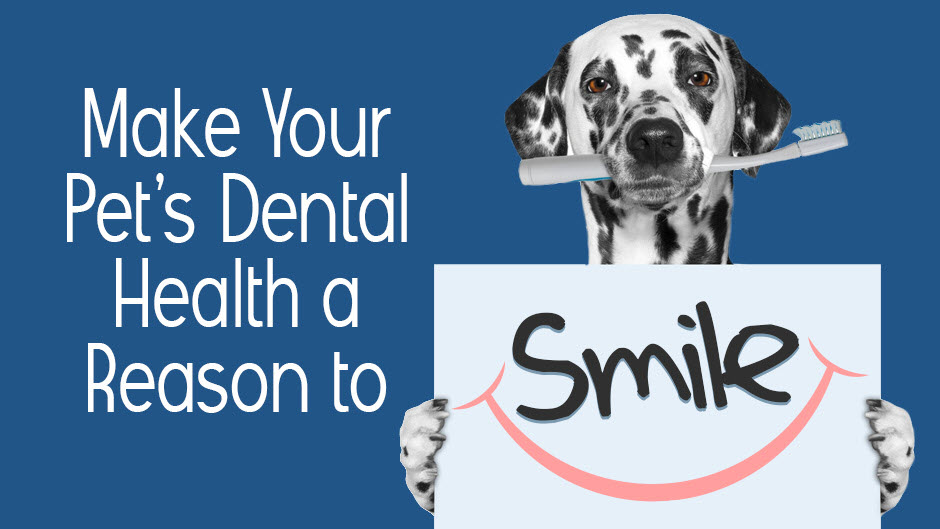Did you know that February is National Pet Dental Health Month? We love that this month is devoted to your canine’s canines, your kitty’s chompers, and your pet’s pearly whites. While your companion’s mouth may be a source of kisses and smiles, pet parents may overlook how much their pet’s dental health affects their overall well-being.
Dental disease is more common than many pet parents realize. 70% of cats and 80% of dogs suffer from some form of oral disease, and by the time they’re three, most dogs and cats will have signs of dental disease.
This Problem is More than Just Bad Breath
The latest studies link periodontal (or gum) disease in dogs and cats to shortened life spans as well as heart, lung, and kidney disease, and feline immunodeficiency virus.
Dogs with good dental hygiene tend to live 2-5 years longer than those without. And cat-specific dental issues like tooth resorption are both painful and can cause long-term issues for some cats.
So, what do you need to know to keep those kitty and canine kisses fresh for years to come? Here are our top tips for keeping your pet’s teeth and mouth healthy:
1. Don’t Skip Regular Vet Visits
Early detection can make a major difference in your pet’s dental health. When gum disease and other dental issues go undetected they can cause severe pain and evolve into more serious problems.
When we examine your pet, we check their teeth to make sure they don’t have any chips, cracks, or gum issues that could lead to infection and pain. When we spot a problem before it becomes worse, it can improve your pet’s mood and quality of life. It also can save you money since treating problems once they’ve progressed tends to be more costly.
2. Recognize Signs of Gum Disease
Do you know what to look for to see if your dog or cat is developing dental issues? The most obvious and common sign of periodontal disease is bad breath. Other warning signs that your pet’s dental health could be improved include:
- Discoloration
- Plaque and tartar
- Red and sore gums
- Reluctance to eat
- Shaking the head or side-to-side head nodding while eating (for cats)
- Cracks or chips
If you notice any of these symptoms, make an appointment to see us.
3. Brush Your Pet’s Teeth
We know… we know… this can feel like a serious chore, if not outright battle, with your pet. And you’re not alone if you skip this step. Only 1% of pet parents brush their pets’ teeth.
But brushing your dog or cat’s teeth can make a world of difference.
It takes 24 hours for plaque to harden, which means daily brushing gives you the opportunity to brush away plaque and tartar before it has the opportunity to stick around and cause damage.
Make brushing your pet’s teeth a habit by:
- Creating a routine where you brush their teeth daily at a certain time
- Start slow and desensitize your pet to having their teeth brushed
- Find a pet-friendly toothpaste that your pet likes
- Combine brushing with dental treats as a reward for a job well done
4. Assess Your Pet’s Diet
This one often comes as a surprise for many pet owners, but your pet’s diet has a direct effect on their dental health. It’s all about nutrition. Proper nutrition helps keep bones, teeth, and gums healthy.
If you have questions about your pet’s diet, we have answers.
5. Professional Cleanings Keep Your Pet Healthy
Getting your pet’s teeth professionally cleaned can make a world of difference. Not only will your pet’s mouth be healthier, but professional cleanings help us assess your pet’s oral health.
The mouth can be a source of lumps and bumps that can go hidden and develop into cysts and tumors. When your pet comes in for a cleaning, we can check their mouth more easily for these and other issues.
A Clean Mouth is a Healthy Mouth
We hope this post gave you ideas for keeping your pet’s mouth sparkling clean, and most importantly, how to keep your pet healthy from teeth to tail. If you have questions about your pet’s health or you want to schedule an exam or cleaning, contact us today.
Image credit: BilevichOlga | iStock | Getty Images Plus


Recent Comments